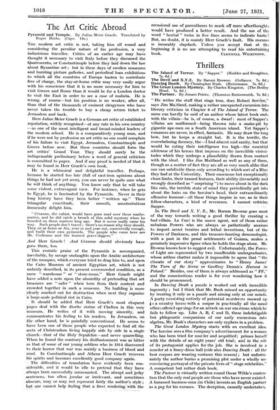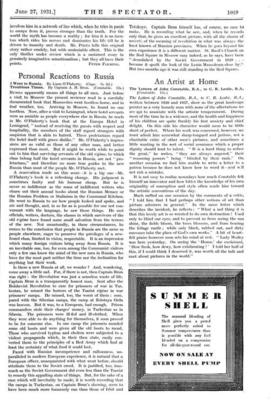Thrillers
Head. 78. 6d.) The Partner. By Jenaro Prieto. (Thornton Butterworth. 78. 6d.)
" HE writes the stuff that rings true, does Robert Service," says Jim Maitland, making a rather unexpected excursion into literary criticism in Chapter 8 of The Island of Terror. The same can hardly be said of an author whose latest book ends with the villain—he is, of course, a dwarf : most of Sapper's villains are malformed—being thrown into a snake-pit by gigantic ape-men on a South American island. Yet Sapper's romances are never, in effect, fantastic. He may draw the long bow, but he keeps a straight bat. It is the terrific, the overwhelming decency, the—I had almost said sanity, but that would be rating their intelligence too high—the essential whiteness of his heroes that imposes on the incredible vicissi- tudes which they undergo a plausibility drawn from contact with the ideal. I like Jim Maitland as well as any of them, though as a matter of fact they are all so very much alike that one can subdivide them only according to which sort of a Blue they had at the Univerkity. Their enormous but exceptionally clean limbs, their tanned features, their ability (invariably and wrongly described as " surprising ") to move about in the dark like cats, the terrible state of mind they periodically get into about the hairs on the heroine's head, their extraordinarily offensive humour—all these things inspire in me; as in their fellow-characters, a kind of reverence. I- -cannot • criticize Sapper.
In The Devil and X. Y. Z., Mr. Barum Browne' gots most of the way towards writing a good thriller by creating a bad villain. Le Cure is the suave agent, not of those rather nebulous Powers who are always so pathetically anxious to import secret treaties and lethal inventions, but of the Powers of Darkness, and this treasure-hunting demonologist, with a past in the penal settlements of Guiana, makes a genuinely impressive figure when he holds the stage Alone. Mr.
Browne knows how to suggest evil. Unfortunately, the Forces of Light are represented by two insufferable undergraduates, whose artless chatter makes it impossible to agree that " the climate of our story " approximates to " Henry James' The Turn of the Screw or Geoffrey Dennis's Harvest in Poland." Besides, one of them is always addressed as " FF," and the conscientious reader is for ever wondering how it should be pronounced.
In Dancing Death a puzzle is worked out with incredible ingenuity ; but I think that Mr. Bush missed an opportunity by treating it only as a puzzle and aiming only at our minds.
A party consisting entirely of potential murderers snowed up 11 a country house with a corpse in practically all the usual offices offered openings for an attack on our emotions which he fails to follow up. Like A, B, C and D, these indefatigable but phlegmatic companions of our early excursions into algebra, Mr. Bush's characters are only cyphers in a problem.
The Great London Mystery starts with an excellent idea. The heroine sees a film company's advertisement for a woman who has been tried for murder and acquitted; primes herself
with the details of an eight years' old trial; and in the role of its protagonist applies for the job. She is involved in a
murder at a fancy-dress ball (vide also Dancing Death : all the best corpses are wearing costume this season) ; but unfortu- nately the author buries a promising plot under a wholly un- convincing portrayal of the private lives of " stage celebrities." A competent but rather drab book.
The Partner is virtually written round Oscar Wilde's conten- tion that the only real people arc those who have never existed. A harassed business-man (in Chile) invents an English partner as a peg for his excuses. The deception, casually undertaken,
involves him in a network of lies which, when he tries in panic to escape from it, proves stronger than the truth. For the world the myth has become a reality ; for him it is an incu- bus which rides his nerves and dominates his life till he is driven to insanity and death. Mr. Prieto tells this original story rather crudely, but with undeniable effect. This is the only thriller under review which is a sustained essay in genuinely imaginative sensationalism ; but they all have their







































 Previous page
Previous page